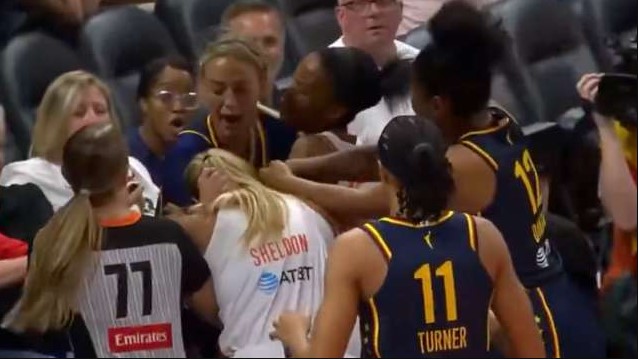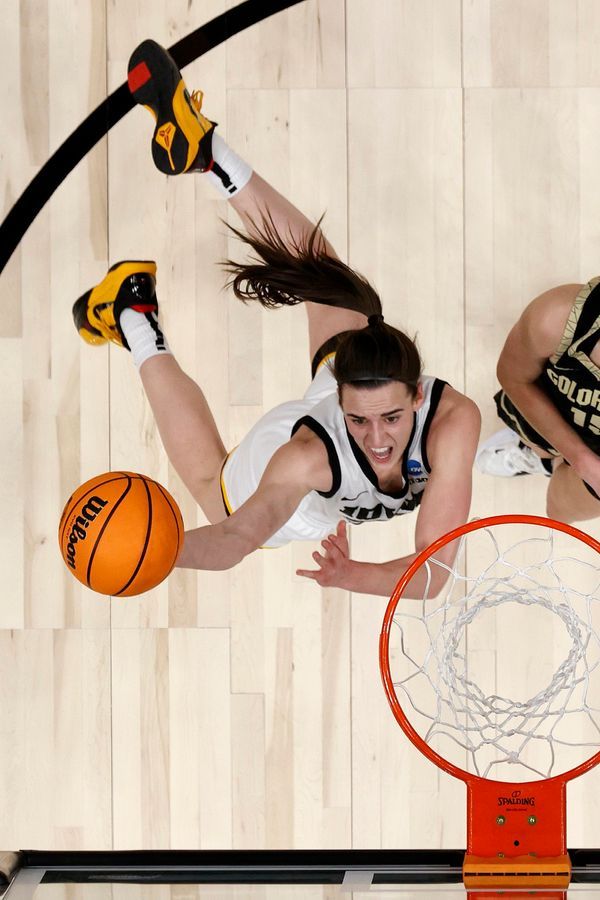WNBA Officiating Under Fire After Controversial Technical Fouls in Fever vs Sun Clash
The Women’s National Basketball Association found itself at the center of yet another officiating controversy following Tuesday night’s heated matchup between the Indiana Fever and Connecticut Sun, where what should have been a routine regular season game devolved into a chaotic sequence of technical fouls and ejection-worthy plays that left fans, analysts, and players questioning the competency of WNBA referees. The incident, which has since sparked widespread debate across social media platforms and sports commentary circles, centered around Indiana Fever superstar Caitlin Clark and her ongoing rivalry with Connecticut Sun guard Jacy Sheldon, two players whose competitive intensity has repeatedly boiled over into physical confrontations throughout the current season.

From the opening tip-off, tensions were palpable between the two teams, with Clark and Sheldon engaging in the type of chippy play that has become characteristic of their matchups, setting the stage for what would eventually explode into a full-scale altercation that required multiple officials and coaching staff members to restore order on the court. The initial spark came during the first half when Clark, frustrated by Sheldon’s aggressive defensive pressure, delivered what appeared to be a relatively harmless push that nonetheless established the combative tone that would define the remainder of the contest between these two fierce competitors.
The situation reached its boiling point during the second half when Sheldon, displaying the type of overly aggressive defensive play that has drawn criticism from opponents throughout her career, made contact with Clark’s face during a defensive sequence, resulting in what officials deemed worthy of a flagrant foul but failed to adequately address the escalating nature of the physical confrontation. Clark’s immediate response, another quick retaliatory push directed at Sheldon, seemed like a natural reaction to the facial contact she had just endured, but it was Connecticut Sun forward Marina Mabrey’s subsequent intervention that transformed a relatively minor scuffle into a major incident requiring official review and disciplinary action.
Mabrey’s decision to blindside Clark with what witnesses described as a forceful shove that sent the Fever star tumbling to the hardwood floor represented the type of dangerous play that typically results in immediate ejection from professional basketball games, yet the officiating crew’s response proved to be as controversial as the incident itself. Rather than ejecting Mabrey for what appeared to be a clear case of unsportsmanlike conduct that endangered player safety, the referees chose to distribute technical fouls evenly among the participants, assessing matching penalties to Mabrey, Clark, and veteran center Tina Charles while giving Sheldon a Flagrant 1 foul for her initial contact with Clark’s face.
The officiating decision immediately drew fierce criticism from basketball analysts, former players, and fans who witnessed the sequence, with many arguing that the referees had fundamentally misunderstood the severity of Mabrey’s actions and the need to protect players from dangerous retaliatory plays. Social media platforms erupted with condemnation of the WNBA’s officiating standards, with one particularly vocal fan declaring that “the WNBA is an embarrassment and none of these refs should EVER be allowed to ref again,” while emphasizing that “player safety should be the MINIMUM thing required for the job” in what has become a recurring theme of criticism directed at league officials.
The controversy surrounding this particular incident reflects broader concerns about officiating consistency and competency that have plagued the WNBA throughout the current season, with fans and media members increasingly vocal about what they perceive as a decline in the quality of game management and player protection. Another frustrated observer captured the sentiment of many viewers when they posted, “The refs in the WNBA are so god awful, it’s embarrassing they have to put up with them,” highlighting the growing disconnect between fan expectations and the actual performance of league officials in high-pressure situations.

Perhaps most telling was the comparison drawn by another fan who noted, “Giving Caitlin Clark a technical foul for getting hit in the face and shoved to the ground is insane,” before adding that while they were “going to say the WNBA needs better refs,” they acknowledged that “NBA refs are just as terrible,” suggesting that officiating problems extend beyond women’s professional basketball. This sentiment was echoed by numerous other commentators who expressed concern that poor officiating could ultimately damage the league’s growing popularity and fan engagement, with one warning that “the WNBA eventually will lose every fan they got right now because of horrible refs.”
The incident takes on additional significance given Caitlin Clark’s status as the most recognizable and marketable player in women’s professional basketball, whose every move on the court is scrutinized by media outlets, social media users, and league officials alike. While Clark has accumulated multiple technical fouls throughout the current season and has demonstrated a tendency to let her competitive emotions influence her on-court behavior, the circumstances surrounding Tuesday night’s technical foul assessment have raised questions about whether officials are applying consistent standards when dealing with incidents involving high-profile players versus lesser-known athletes.
The timing of this controversy could not be worse for a WNBA that has experienced unprecedented growth in viewership, attendance, and media coverage, largely driven by Clark’s arrival and the intense interest surrounding her professional debut season. As the league continues to capitalize on this momentum and work to establish itself as a premier professional sports product, officiating controversies like Tuesday night’s incident threaten to undermine the credibility and entertainment value that have attracted new fans and corporate sponsors to women’s basketball.

Moving forward, the WNBA faces mounting pressure to address these officiating concerns through improved training programs, enhanced accountability measures, and clearer guidelines for handling on-court altercations, particularly those involving star players whose actions and treatment by officials can significantly impact the league’s public perception and long-term viability in an increasingly competitive sports entertainment landscape.